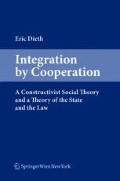Abstract
The world we live in could be so simple. We could commission people to find out what the truth is (so-called “scientists”). We would listen to their objective results and would behave according to the facts, the reality the experts discovered. We would have experts for every single problem, be it medical, psychological, technical, economic, legal, cultural, or political. Being reasonable individuals, we wouldn’t discuss the cognition of the experts. Because we would want to survive, we would follow the unequivocal expertise produced by the knowledge-elite: You cannot live against the reality, otherwise you die. In the enlightened society, the scientists have taken the place of the priests, who were the ones giving advice in earlier societies. In my point of view, however, the guidance by scientists fails, because there are as many “realities” as there are scientists. If reality was such a helpful orientation point, why are there always such intense disputes between the scientists about this very reality? Why are there so many different factions within the sciences, competing each other over the real knowledge?
Preview
Unable to display preview. Download preview PDF.
References
Barber, Benjamin R. (2010)
About the Bonobos see de Waal, Frans (1991), pp. 173–228, de Waal, Frans (1989), de Waal, Frans/Lanting, Frans (1997), or National Geographic Society (1993), pp. 42 f., 105.
Barber, Benjamin R. (2010)
Hedges, Chris (2009), pp. 15 f.
Id., pp. 44 f., 51
Id., p. 26
Renz, Ursula/ Bleisch, Barbara (ed.) (2007), p. 9
Tanner, Jakob (2007), p. 88
See hereto Simon-Muscheid, Katharina (2002), pp. 153 f.
Hindle, Steve (2001), p. 117
Conwell (1843–1925) was American Baptist minister, lawyer, and writer and is the founder of Temple University in Philadelphia (Penn.).
Zinn, Howard (1999), p. 262
Simon-Muscheid, Katharina (2002), p. 162
Rose, Michael E. (1988), p. 57
Brundage (2002), p. 66
Id., p. 59
Rose, Michael E. (1988), p. 67
Langford, Paul (2001), pp. 431 ff.
Henry George (1839–1897) was social philosopher and journalist, published in 1879 “Progress and Poverty”, a book proposing remedies to the problem of inequality. It was a huge success, having been sold more than three million times.
George, Henry (2005), p. 10
Id., p. 11
Id., p. 12
Fraser and Gordon speak of the “ideology of contract-versus-charity” (Fraser, Nancy/ Gordon, Linda [1994]).
Zedler, Johann Heinrich (1732–1754)
Klocke, Andreas (2000), p. 313
Lipsmeier, Gero (1999), p. 281
Simmel, Georg (1992), pp. 548, 551
Smith, Adam (1994 [1776]), pp. 938 f. [Book V, Chapter II, Part II, Article IV]
In this sense see Sen, Amartya (1999), p. 110.
Id., p. 87
Id., p. 93
Id., pp. 104 ff.
Id., p. 88
Id., p. 103, 96
Paugam, Serge (1998), pp. 49–52
Yunus, Muhammad (2007), p. 5
Id., p. 54
Id., pp. 11 ff., 56
Id., p. 104
Id., p. 112
Stiglitz, Joseph (2002), p. 103
Kronauer, Martin (2002), p. 17
Linke calls “poverty” a “plea-word” (Linke, Angelika [2007], p. 39).
Galbraith, John Kenneth (2005), p. 11
Kirchgässner, Gebhard (1991), p. 27
Beinhocker, Eric D. (2006), p. 5
Id., p. 419; see also p. 121
Id., p. 48
Id., p. 5
Id., p. 14
Mitterer, Josef (1992), p. 110
Popper, Karl R. (1992), p. 22
Popper, Karl R. (1979), p. 40
Id., p. 44
Id.
Id., pp. 46 f.
Id., pp. 57 f.
Popper, Karl R. (1994b), pp. 49 f.
Id., p. 234
Popper, Karl R. (1979), p. 318. See also p. 121, or Popper, Karl R. (1994b), pp. 39 f., 232; Popper, Karl R./Eccles, John C. (1996), p. 188, 190
A position, Popper also defends, but on epistemological grounds: “[...] realism is neither demonstrable nor refutable” (Popper, Karl R. [1979], p. 38).
Liessmann, Konrad Paul (2006), p. 8
Id., p. 173
Nietzsche, Friedrich (1996), p. 369
Id., p. 385
Abosch, Heinz (1993), pp. 193 f.; Popper, Karl R. (1994a), p. 162
Popper highlights the importance of taking risks and being creative (Popper, Karl R. [1979], pp. 54 ff.).
Mike Leigh (2007), Min. 4’ 22”
Malinowski, Bronislaw (1922), p. 25
Kohl, Karl-Heinz (2000), p. 112
Quoted in Därmann, Iris (2002), p. 22
Därmann, Iris (2002), p. 23
Kohl, Karl-Heinz (2000), p. 26
About the difficulties to differentiate between subject and object see Jamme, Christoph (2002), p. 191. For relative recognition abilities see for example Wierlacher, Alois (1993), p. 48, Waldenfels, Bernhard (1999), p. 113, Zingerle, Arnold (1993), p. 431, and Cappai, Gabriele (2000), p. 272.
Author information
Authors and Affiliations
Rights and permissions
Copyright information
© 2011 Springer-Verlag/Wien
About this chapter
Cite this chapter
Dieth, E. (2011). Social construction of “reality”. In: Integration by Cooperation. Springer, Vienna. https://doi.org/10.1007/978-3-211-99416-0_2
Download citation
DOI: https://doi.org/10.1007/978-3-211-99416-0_2
Publisher Name: Springer, Vienna
Print ISBN: 978-3-211-99415-3
Online ISBN: 978-3-211-99416-0

